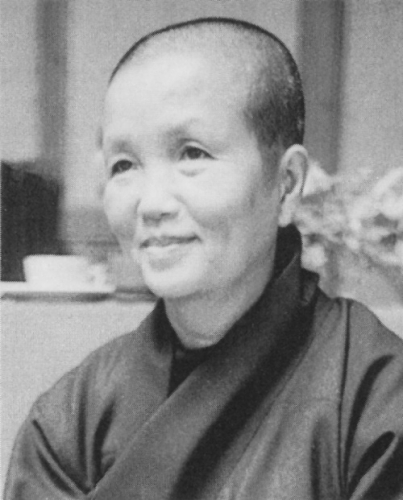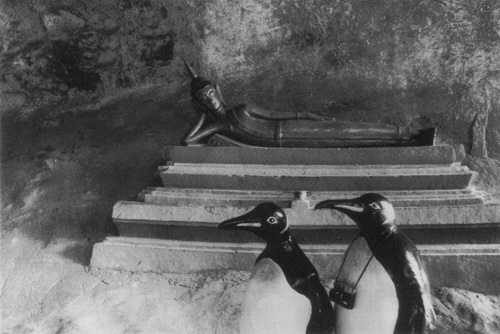Chan Khong
Parallax Press, Berkeley, 1993.
258 pp., $16.00 (paper).

A young woman rides a motorbike along a road in Vietnam, a box of banned pamphlets strapped behind her, bombs exploding so near that she is sure she will be killed.
The same woman comes upon a platoon of U.S. soldiers preparing to destroy a village where they suspect the presence of Vietcong. Looking deep into their eyes, seeing their fear, she convinces them that no guerrillas lurk among the thatch houses. The soldiers leave.
Frustrated by obstacles to efforts she and activist monk Thich Nhat Hanh have made to save the boat people fleeing Vietnam, this woman convinces her brother and friends to join her on a “fishing boat.” In their small craft they ply the waters off the coast of Thailand, dodging pirates and government officials, to secretly aid the boatloads of Vietnamese refugees they encounter.
These and more images stay with me after reading Chan Khong’s Learning True Love. The book reveals a gifted, immensely resourceful, wonderfully brave woman whose immersion in Buddhist practice and principles guides her untiring activism on behalf of the Vietnamese people. It offers inspiration to Buddhists and non-Buddhists alike who seek to cultivate peace. And through the life of one extraordinary woman we get a privileged glimpse into the experience of the Vietnamese people during the war.
This odyssey of compassion begins with Chan Khong’s learning from her family to give to those who have less, care for those who cannot care for themselves. It describes Chan Khong’s early efforts in her own country and then moves to the arena of international diplomacy as she joins Thich Nhat Hanh in Paris to work for peace.
Her experience in Vietnam in the sixties is harrowing. Bombings and harassment by combatants on both sides hindered the work of the School of Youth for Social Service, an institution founded by Thich Nhat Hanh and Khong to send students to help the people in the villages. In one striking section Chan Khong tells of carrying decomposing corpses from the battlefield. We remember the images on our television screens of some Vietnamese monks and nuns seated peacefully, wreathed in flames. The chapter describing the self-immolation of Sister Mai, a good friend and co-worker of Chan Khong, depicts Khong at first questioning whether self-immolation could be a proper act for a Buddhist to perform. But when she saw the increased concern for her people that followed her friend’s death, she conceded the power of self-sacrifice.
On a trip to the United States to represent the Vietnamese Buddhist Peace Delegation, she and Thich Nhat Hanh were shocked to discover that a good portion of the peace movement here advocated the victory of the Communists. “If supporting Hanoi would bring happiness to the Vietnamese people, we would do so,” she explained to the Americans.
But war and violence only bring more destruction. We have witnessed the Vietnamese warring parties violently destroying their own people. We prefer to live simply, helping people control their own fates with their own small means. That is why we refuse to support either side.
In recent years Chan Khong turned her attention to sending aid to artists, poets, and writers who had been silenced in Vietnam. And she persuaded Amnesty International to help on behalf of prisoners in Vietnamese “re-education camps.” At Plum Village, the retreat center established by Thich Nhat Hanh and Sister Khong in the Dordogne region of France, she counsels refugees and instructs the many Western meditators who come each year.
How does Chan Khong maintain her equilibrium in the midst of this demanding, stressful, often discouraging work, and avoid the burnout that Western activists experience? In each hugely busy week, she and her fellow workers select one day as a whole “day of mindfulness” in which to meditate, sit quietly, return into themselves, and reestablish their calm.
Sister Chan Khong, now in her mid-fifties, only recently took the robes of a Buddhist nun. Even after a life of such dedication and courage, she waited, she tells us, until she could feel worthy of the veneration those robes awaken in the Buddhists of her country. Her book, which has the pace and excitement of an adventure story and the depth of a spiritual inquiry, suggests the arduous preparation she underwent.
With precious few Buddhist political, spiritual heroines to inspire us, Chan Khong stands among the most compassionate, persistent, and brave.

Thank you for subscribing to Tricycle! As a nonprofit, we depend on readers like you to keep Buddhist teachings and practices widely available.